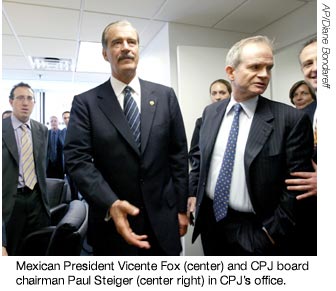New York, September 15, 2005—Mexican President Vicente Fox said today he will ask his nation’s attorney general to appoint a special prosecutor to investigate crimes against free expression, a commitment made after a series of deadly attacks against journalists in Mexico’s northern states.
Meeting with a delegation from the Committee to Protect Journalists at the organization’s Manhattan headquarters, Fox called the appointment a “strong and good step forward” and pledged to meet with Attorney General Daniel Cabeza de Vaca on Monday to move forward with the plan.
“We have the same worries and we have the same commitment to work on this,” Fox told the delegation led by Paul Steiger, CPJ chairman and Wall Street Journal managing editor. “We have to work specifically on the problem of people in the press who are suffering.”
Fox also promised to consider creation of a panel of national experts to evaluate how federal authorities can become more involved in fighting crimes against the press. He said he would discuss the matter with Cabeza de Vaca.
CPJ research shows that northern Mexico, particularly the region along the U.S.-Mexican border, has become one of the most dangerous places in Latin America for journalists to do their jobs. In its meeting with Fox and presidential advisers, the CPJ delegation said Mexican journalists are targeted for their coverage of sensitive issues such as drug trafficking, organized crime, and political corruption.
“This is very important for Mexico and free expression,” said CPJ Executive Director Ann Cooper. Noting that impunity in the murders of journalists is a problem in countries throughout the world, Cooper said: “If some very serious headway is made in Mexico … it would be seen as a shining example to the rest of the world.”
Four Mexican journalists have been killed in direct reprisal for their work in the last five years, CPJ research shows. The organization is investigating the slayings of five other journalists, whose murders may also be related to their work. Yet another reporter—Alfredo Jiménez Mota of the Hermosillo daily El Imparcial—has been missing since April 2 and is feared dead.
Murder is a state crime, and state prosecutors usually investigate slayings in Mexico. But Fox has said that violence against the press is a national problem, and has pledged his government’s commitment to protect journalists.
State investigations of journalist murders have stalled or moved forward only sluggishly, CPJ research shows. State and local authorities are more prone to corruption, have fewer resources, and are subject to less accountability, CPJ found.
CPJ had sent the president’s office a two-part proposal before the meeting, urging greater and more permanent involvement by federal authorities in the investigation of crimes against free expression. Protection of free expression is particularly urgent, CPJ representatives said, as Mexicans prepare for presidential elections in July 2006.
As proposed by CPJ, a special prosecutor would investigate violence or threatened violence aimed at preventing the right to free expression guaranteed by articles 6 and 7 of the Mexican Constitution. The prosecutor would work under supervision of the attorney general.
The special prosecutor would evaluate crimes against free expression, determining which should be directly prosecuted by federal authorities and monitoring the progress of all cases. CPJ asked that the prosecutor’s appointment be made in consultation with the media and with press and free expression organizations. The nominee, CPJ suggested, should be widely respected in Mexican society.
At CPJ’s request, Fox said he would consider creation of a panel to evaluate greater federal involvement in combating crimes against journalists. CPJ urged that the panel consist of experts in free expression, and that it issue a public report and recommendations within six months.
The CPJ delegation also included Deputy Director Joel Simon; Americas Program Coordinator Carlos Lauría; and board members Josh Friedman, Cheryl Gould, Michael Massing, Geraldine Fabrikant-Metz, and Franz Allina.
Today’s meeting followed a CPJ trip to Mexico City in June. Meeting with José Luis Vasconcelos, the top prosecutor in the organized crime division of the federal attorney general’s office, CPJ officials expressed concern about the slow pace of investigations into the murders of Mexican journalists. CPJ submitted a detailed analysis of murder cases since 2000, the year Fox was elected president. Federal authorities have already stepped in to take over three investigations of murdered journalists.
![]()
